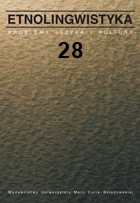The dualism of the ‘sacred’ and the ‘profane’ in the poetic narrative of ‘The Lay of Skirnir’ and Lithuanian wedding songs
The dualism of the ‘sacred’ and the ‘profane’ in the poetic narrative of ‘The Lay of Skirnir’ and Lithuanian wedding songs
Author(s): Giedrė BuivytėSubject(s): Language and Literature Studies
Published by: Wydawnictwo Naukowe Uniwersytetu Marii Curie-Sklodowskiej
Keywords: mythical formula; prototypical image; transformation of role; implicit mythical reference; poetic mode of thought
Summary/Abstract: Comparative Indo-European poetics studies the poetic diction common to Indo-European tradition. Moreover, the Indo-European daughter traditions share a common division of mythology. With reference to comparative mythology and the roles of gods, the general division of the universe reveals the following layers: “magical sovereignty (and heavenly administration of the universe), warrior power (and administration of the lower atmosphere), and peaceful fecundity (and administration of the earth, the underworld and the sea)” (Dumezil 1988: 121). The essential aspect of archaic worldview has the following shape: “Life is lived on a twofold plane; it takes its course as human existence and, at the same time, shares in a transhuman life, that of the cosmos or the gods” (Eliade 1959: 167). This paper aims at revealing the transformations of the theme of the celestial wedding from the sacred to the profane with reference to the poetic narrative of The Lay of Skirnir and Lithuanian folk songs. The argument involves: (1) an analysis of the reflection of the myth theme and its motifs in the poetic narrative; (2) deciphering mythic formulas as embedded in the context of the poetic narrative. In the folk songs, the bride and the bridegroom imitate the actions of their celestial prototypes. The motif of shaking the earth, as rendered by the formulas Jörð bifask ‘the ground shakes’ and žemuže dreba ‘the earth shakes’, is manifest in both traditions, inasmuch as it is linked to the metaphorical “shaking of the bride” in the prototypical mytheme, employed to convey the unwillingness of the bride to marry.
Journal: Etnolingwistyka. Problemy Języka I Kultury
- Issue Year: 28/2016
- Issue No: 28
- Page Range: 257-276
- Page Count: 20
- Language: English

